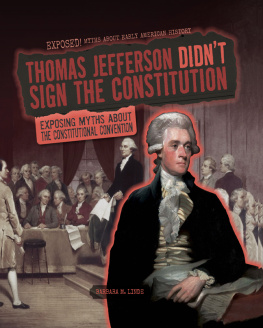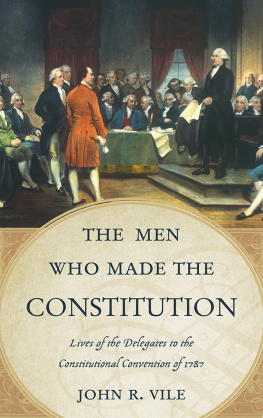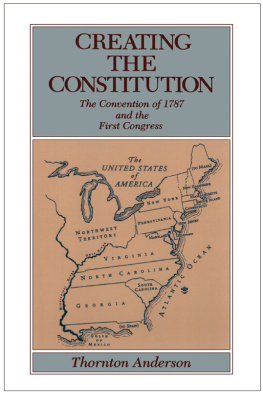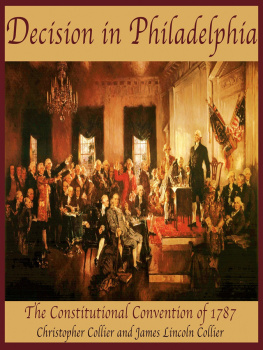www.upress.state.ms.us
The University Press of Mississippi is a member of the Association of American University Presses.
Copyright 2018 by University Press of Mississippi
All rights reserved
Manufactured in the United States of America
First printing 2018
Library of Congress Cataloging-in-Publication Data
Names: Pratt, Dorothy O., 1949 author.
Title: Sowing the wind : the Mississippi constitutional convention of 1890 / Dorothy Overstreet Pratt.
Description: Jackson : University Press of Mississippi, [2018] | Includes bibliographical references and index. |
Identifiers: LCCN 2017026732 (print) | LCCN 2017027884 (ebook) | ISBN 9781496815477 (epub single) | ISBN 9781496815484 (epub institutional) | ISBN 9781496815491 ( pdf single) | ISBN 9781496815507 (pdf institutional) | ISBN 9781496815460 (hardcover : alk. paper)
Subjects: LCSH: Mississippi. Constitutional Convention (1890) | Constitutional conventionsMississippi. | Constitutional historyMississippi. | MississippiPolitics and government18651950. Classification: LCC KFM7001 1890.A29 (ebook) | LCC KFM7001 1890.A29 P73 2018 (print) | DDC 342.76202/92dc23
LC record available at https://lccn.loc.gov/2017026732
British Library Cataloging-in-Publication Data available
Prologue
This has been, hands down, the most complex project I have ever undertaken. The difficulty came not because it was a lengthy project (although it was), or because the sources were hard to find (they were), but rather because the production of the book has been emotionally draining. This is not an uplifting narrative. No one is a hero. No one comes off well. It is an American tragedy.
I thought I knew the story. Having been raised in Mississippi by parents born in the state, and with three of four grandparents who were natives, I thought I understood the history, with all its flaws and triumphs. Like many historians before me, I had simplified this period by believing that the constitutional convention, as well as its subsequent document, was a reform effortabsolutely misguided and based on bigotry, but a reform nonetheless. In fact, a letter to the Clarion-Ledger, of Jackson, Mississippi, in 1890 argued that old men of the present generation cant afford to die and leave their children and grandchildren with shot-guns in their hands, a lie in their mouth and perjury on their lips in order to defeat the negroes.1 That statement appeared to confirm my initial interpretation. But as I did the research and unpeeled the layers of argument, cynicism, and corruption, I was left with little of the good. The story had to be rewritten.
The simple fact that this is not a nice story makes its acceptance problematic. Mississippi deserved better leaders than it had, and the consequence was a state mired in a slough of economic despondency and governmental malaise. Yet these leaders should not be assumed to have been stupid or without sophistication; in fact, their ability to manipulate the law was extraordinary. Unfortunately, while often intelligent and well-informed, they were wrong-headed about so much. Histories of the state often emphasize, with some justification, that narrow-mindedness and the problems it caused. Yet since the 1970s the state has moved far beyond the days of Jim Crow. This does not mean there are not problems even yet. There are. But the state of Mississippi in 1963 is not that of 2017. Understandably people in the state would like to be recognized for what they have accomplished in those intervening years, not simply by a dark history. Again, the state and its people deserve better.
In addition, the facts behind the narrative have not been easy to accumulate, much less to analyze and communicate. During the period of the turn of the century (nineteenth to twentieth), newspapers reflected their southern heritage: here, one does not speak of shameful or bad things. That reticence was part of the culture, whether in a family or within a community. Too much of the story has to be gleaned from newspapers outside the state. Thankfully, both Proquest and Chronicling America have helped make digital searches possible and accumulation of fact accessible. Moreover, even when newspaper accounts were available, especially with the constitutional convention, the states African American newspapers remain missing for this period, as they are no longer extant. Helpfully, however, other newspapers, including the Clarion-Ledger from Jackson, often referred to those papers and quoted from them.
I need to thank the staff of the Mississippi Department of Archives and History, the Library of Congress, and the Law Library of the University of South Carolina. These librarians went out of their way to help find obscure references. I should also thank my colleagues, Wanda Hendricks, who read chapters and kept me on target referencing African American reactions; Don Doyle, who asked probing questions and encouraged me to work toward publication; Matthew Holden, who is actually from Mound Bayou and probably cares more about this research than even I; and Reece Carlton, also a Mississippi native, who graciously edited my sentences. My sisters, Theresa and Pattie, read the manuscript and went to the state archives at times when I could not make it. My husband, Jack Pratt, also read chapters and courageously suggested edits dealing with legal history. He is greatly appreciated, not only for his insight but also for his endless patience. My dean, Mary Ann Fitzpatrick, also provided support that made the work possible. The University Press of Mississippi staff (along with my anonymous outside readers and Robert Burchfield, a superb copy editor) deserve rich thanks for their help and support in bringing this manuscript to light and life. Finally, to all those who kindly asked after the manuscript that took so many years to reach fruition, thank you all. I needed the encouragement, for at times the story was too much to take in.
During the writing of this history, I discovered not only a powerful narrative but also a number of tantalizing (but tangential) subjects. The book is long enough without having sidetracked to trace these tempting avenues of investigation. There are issues within the constitution that ought to be analyzed by practicing attorneys. The levee problems should be examined by someone familiar with water problems and property law. The infighting between the black Republicans in Mississippi ought to be thoroughly scrutinized, especially noting the problems of class. These and other issues I leave to the next generation of historians of the state.
I also have found in the research and writing of this manuscript a strong correlation between nation-building in the nineteenth century and that of the twenty-first. Failed states in the nineteenth have equally compelling association with the twenty-first century. The difference is that the failed state of Mississippi was composed of Americans who shared a common heritage with the rest of the country. They also shared a common national economy and what should have been a common political structure. What they did not share was a common worldview. Their optimism was not unbounded. They believed that growth was limitedtheir experience confirmed that belief. Those who controlled that growth and benefited from it would hold the power in the state. The subsequent struggle was immense. To a large extent, the story of Mississippi and its constitutional convention of 1890 is a cautionary tale, one to be ignored at our peril.






